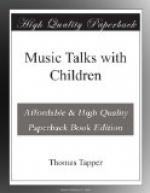You will soon see when you have read about the composers that true music comes out of true life. Then you will begin to love true life, to be useful, and to help others. But all these things do not come at once. Yet, as we go along step by step, we learn that art is unselfish, and we must be so to enjoy it; art is truthful—we must be so to express it; art is full of life—we must know and live truth in order to appreciate it. And the study of pure thoughts in music, in books, and in our own life will help to all this.
CHAPTER XVI.
THE HANDS.
“The skill of their hands still lingers.”—John Ruskin.[52]
In one of our Talks, speaking about the thoughts in our hearts, we said that they crept from the heart into our arms and hands, into the music we play, and off to those who hear us, causing in them the thoughts by which they judge us. Thus we see, that as Janus stands sentinel at the doorway of the year, so the hands stand between the secret world of thought within and the questioning world of curiosity without.
If we were not in such a hurry usually, we might stop to think that every one, all over the world, is training the hands for some purpose. And such a variety of purposes! One strives to get skill with tools, another is a conjurer, another spends his life among beautiful and delicate plants, another reads with his fingers.[53] In any one of these or of the countless other ways that the hands may be used, no one may truly be said to have skill until delicacy has been gained. Even in a forcible use of the hands there must be the greatest delicacy in the guidance. You can readily see that when the hands are working at the command of the heart they must be ever ready to make evident the meaning of the heart, and that is expressed in truthful delicacy. Not only are all the people in the world training their hands, but they are, as we have already said, training them in countless different ways.
Have you ever stopped to think of another matter: that all things about us, except the things that live, have been made by hands? And of the things that live very many are cared for by the hands. These thoughts will suggest something to us. Those things which are good and beautiful suggest noble use of the hands; while those which are of no service, harmful and destructive, show an ignoble use. But noble and ignoble use of the hands is only another evidence of thought. Thought that is pure in the heart guides the hands to beautiful ends. And if the heart is impure in its thoughts, of course you know what follows.




